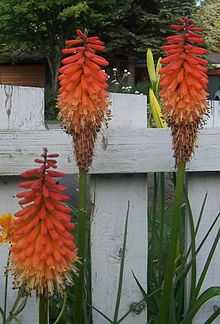Kniphofia uvaria
| Kniphofia uvaria | |
|---|---|
 | |
| Kniphofia uvaria, commonly known as the Torch Lily, Red Hot Poker, or Tritoma | |
| Scientific classification | |
| Kingdom: | Plantae |
| Clade: | Angiosperms |
| Clade: | Monocots |
| Order: | Asparagales |
| Family: | Xanthorrhoeaceae |
| Subfamily: | Asphodeloideae |
| Genus: | Kniphofia |
| Species: | K. uvaria |
| Binomial name | |
| Kniphofia uvaria L. | |
Kniphofia uvaria is also known as Tritoma, Torch Lily, or Red Hot Poker due to the shape and color of its inflorescence. The leaves are reminiscent of a lily, and the flowerhead can reach up to 1.52 m (5.0 ft) in height. There are many varieties of torch lily, and they bloom at different times during the growing season. The flowers are red, orange, and yellow.

Distribution
Kniphofia uvaria originates from the Cape Province of South Africa,[1] and has been introduced into many parts of the world, such as North America, Australia, New Zealand, and Europe as a garden plant. It is hardy in zones 5-10.
In parts of south-eastern Australia, such as the Central and Southern Tablelands of New South Wales and southern Victoria, it has escaped cultivation and become naturalised.[1] It is now regarded as an environmental weed in these locations, spreading from former habitations into natural areas, where it can grow in thick clumps and threaten sensitive ecosystems. Elsewhere in southern Australia it is regarded as a potential environmental weed, and it may have also naturalised in parts of South Australia and California.[1]
References
- ↑ 1.0 1.1 1.2 "Factsheet: Red hot poker – Kniphofia uvaria". Weeds of Australia: Biosecurity Queensland Edition. Queensland Government. 2011. Retrieved 10 February 2012.
- Pink, A. (2004). Gardening for the Million. published as an e-book by Project Gutenberg Literary Archive Foundation. This book only uses the name "Tritoma".
External links
| Wikimedia Commons has media related to Kniphofia uvaria. |